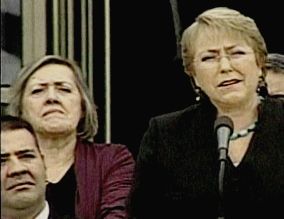 |
Since the day Peru and Bolivia became independent countries, many military and civilian leaders felt themselves chosen by destiny to rule their countries and so year after year they engaged in continuous civil war. Once in power most of these leaders squandered as much public money as they could and rewarded their followers and henchmen by giving them jobs in the government and/or land made available upon eviction of indian peasants.
There were times in Bolivia and Peru when two or three ringleaders or warlords claimed simultaneously to be the President of the country. Meanwhile, in Chile politics unfolded in a more orderly way--in comparison with Peru and Bolivia, coups d’etat were few and far between in that country.
Before the Saltpetre War Chile was not a rich country, it did not have the natural resources (guano, saltpetre, gold) that Bolivians and Peruvians dissipated in an endless maelstrom of greed, bigotry and violence. Chilean politicians observed their neighbours’ helpless disaster and came to the conclusion that the wealth of natural resources of Bolivia and Peru could and should become a long-lasting source of sustenance and juicy profits for Chile.
At this point came into being the Chilean idea of waging war1 on Bolivia and Peru, in order to rob them of territories and to fatally cripple their development for generations to come. Quietly and steadly Chile began to buy modern military equipment that would prove decisive in the war (1879-1883), in principle an easy war, given the political restlessness and economic and military weakness of its shortsighted neighbours that kept on staging coups d’etat even when the war was in progress!
The war started in February 1879 with every advantage to Chile2. The Bolivian army fought alongside Peru just up to October 1879. From then on Peru single-handedly confronted the unequal war resorting to guerrilla warfare until July 1883. Once Peruvian resistance ceased, Chile installed a Peruvian puppet government and by force of arms made it sign a peace treaty whereby the Peruvian Tarapaca Province passed onto Chilean hands.
The treaty stipulated a referendum that would decide the sovereignty of the Peruvian city of Arica but Chileans consistently refused to make the referendum--instead they proceeded to ethnic cleansing, killing the Peruvian inhabitants or forcibly driving them out of their homes. Bolivia fared much worse off--when it lost to Chile its litoral Antofagasta province it became a land-locked country to this day3.
It is only natural that Bolivians and Peruvians resent the Chilean usurpation and keep on honouring their national heroes who died fighting the invading Chilean robbers. In a show of blatant cynicism Chileans say “Bolivians and Peruvians hate us, why? We are brotherly peoples! Let bygones be bygones, the war is history, let us see the future together!” In order to throw into oblivion the robbery they made, in 1985 Chilean politicians bribed the Peruvian government and made it sign a document whereby the teaching of History in Peruvian schools should be rewritten4 in order to whitewash the crude episodes of the war (extensive looting, massive murdering, ethnic cleansing, terrorism5, usurpation of territory).
But one thing is to bribe politicians corrupt to the core, and quite another is to make the Peruvian people to accept a falsified History. We Peruvians and Bolivians know what really happened and will never accept a Chilean-biased exposition of the facts. Not being gullible does not make us haters or embittered people, we just call a spade a spade--Chile committed robbery and terrorism and usurps Bolivian Antofagasta and Peruvian Tarapaca to this day; that’s why we call the Chileans thieves, robbers.
Telling the truth is not tantamount to hating anybody. When we say that Chileans are robbers and terrorists we are not expressing any negative feeling. We do not harbour any hatred against Chileans, anymore than a judge hates a criminal when he sends him to jail. On the contrary, it is Chile that has always hated Bolivians and Peruvians, so much so, that it took its hate to the worst possible level--robbery, murder and terrorism. Chileans show no repentance for these heinous crimes. On the contrary, to this day Chile hails and pays tribute to the murderers, robbers, looters and terrorists it sent to devastate Peru and Bolivia. This is real hatred.
The desire and achievement of peace can be enhanced by avoiding negative stimuli, that is, things or situations that make the invaded countries (Bolivia and Peru) to remember the war and its consequences. On the part of the Chileans, an obvious and peace-seeking behaviour would be not to show up in Bolivia and Peru, where Chileans are regarded as filthy rats. The less we see the stinky Chilean rats, the better.
______________________________________
1 Read Theft-oriented Chile declares war on Peru on April the 5th, 1879.
2 Read Chilean cynicism--“We waged a defensive war” .
3 At the sight of Chilean politicians or diplomats, Bolivians are scared to death. For this reason, Bolivians, who badly need a port on the Pacific Ocean, never dare to say “Give us at least a part of Antofagasta back”; they say instead “Give us a port north of Arica” (something impossible, as the 1929 treaty signed by Peru and Chile entitles Peru to have a say--a heavy “No”-- when it comes to the transfer of former Peruvian territory to other country).
4 Read ¡Infamia contra escolares al descubierto!, ¡Lavado cerebral a escolares promovido por Ministerio de Educación! and Crisis de la profesión de Historia.
5 The infamous navy captain Patricio Lynch, a Chilean thief and murderer, is the forefather of modern terrorism. In cities and villages under Chilean occupation he demanded money at gunpoint--if the people were not able to give him the money or jewels he burned houses to the ground or blew up with dynamite factories, railroads and piers.
